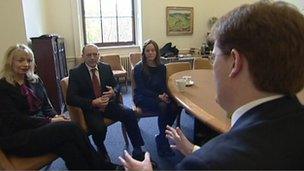Danny Alexander meets North East trade unionists
- Published
Striking union members from the North East and Cumbria visit chief treasury secretary
On Wednesday 300,000 people from the north-east of England and Cumbria went on strike.
They were among many more across the country but three of them - a headteacher, a librarian and a council sports events manager - have something most of the others have not.
They have had the opportunity to question someone right at the heart of the government's plans to overhaul the public sector pension system.
These three trade unionists - from Sunderland, Middlesbrough and Carlisle - had never met before but BBC Look North brought them together in London for a meeting with the chief secretary to the treasury, Danny Alexander.
Pauline Wood, head at Grange Park Primary School in Sunderland and a member of the National Association of Head Teachers voted against the strike. Not because she is happy with the pension changes but because she does not think causing disruption will achieve what they want.
Her question to Mr Alexander is simple: "The money that we were promised was in our pension pot and was sufficient to be sustainable. How come that is now eroded and we feel like we've been burgled?"
'Arguments lined up'
Not for the first time he explains: "We're all living longer, our life expectancies are greater, we have to make sure that as a country every taxpayer can continue to afford the cost of pensions.
"And that means we need to move the balance between how much time people spend in work and how much they spend in retirement."
Karen Gallagher, a member of Unison at Cumbria County Council's library services, notes the delivery: "He's obviously very familiar with the subject, he has all his arguments lined up and he's not said anything that he hasn't said before."

The meeting lasted less than an hour and there were no unexpected concessions
Jimmy Wattis, a Unite member and sports events manager for Middlesbrough Council, supports the strike but wishes it had not landed just before Christmas.
He says before the meeting: "If we don't make a stand now, then we agree to the terms and conditions, the proposals. Come 2015 then it could even get worse so I think we've got to stand up for ourselves now."
He asks Mr Alexander how he thinks pension changes, on top of job cuts, are affecting staff morale.
The reply is conciliatory, reassuring that the dampened spirits are recognised, but pointing out the dangers of governments losing control of finances like in "other European countries".
'Efficient communication'
For three quarters of an hour the trio make points that have been made many times before, albeit not often by ordinary workers direct to a cabinet minister.
What if people can't afford the extra contributions? What happens if people pay in less, get smaller pensions and have to rely more on the state when they retire? Why should anyone pay more and work longer?
They come out happy that they have made their point but not convinced by the government's line, direct from the horse's mouth.
Neither do they believe they have told Mr Alexander anything that might make him rethink his arguments.
They will still strike.
The minister, however, is pleased with the meeting, admitting the government "could do a better job of explaining what we're actually offering."
He adds: "I genuinely believe the more individual teachers, the more individual nurses and civil servants and local government workers look at what's really on the table I think people would be quite reassured.
"I certainly hope they would be.
"If I see everyone three at a time, maybe that's the way to do it. But I think we'll have to find a more efficient way of communicating than that," he adds, laughing.
- Published30 November 2011
- Published22 November 2011
- Published27 November 2011
- Published26 November 2011